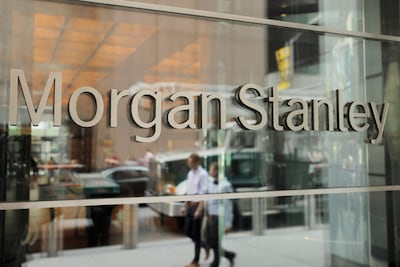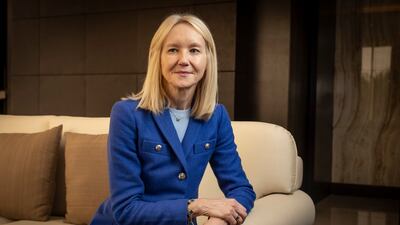Markets in the GCC and the broader Mena region are on the right growth trajectory and the flow of deals for investment banks is likely to continue even after goals of the economic diversification programmes are achieved, a senior Morgan Stanley executive has said.
The basic ingredients, in terms of policy and regulatory frameworks, are in place for the regional economies to continue growing and there is no reason why the trend should not continue, Clare Woodman, Morgan Stanley’s head of Europe, Middle East and Africa, told The National in an interview.
“All the factors that are required to develop and build out markets, to enable society to enjoy good infrastructure, good-quality standard of living, are all there,” she said.
“There's a lot of support and alignment from … the government where it's needed to help these initiatives and I think absolutely the ingredients are there for one to expect to see the trend, the growth trend, continue.”
Global headwinds and economic uncertainty, however, could dampen growth and subsequently the flow of deals, added Ms Woodman, who is also chief executive of Morgan Stanley International.
Morgan Stanley and other global and regional investment banks have seen a rise in debt and equity capital market deals, as well as mergers and acquisitions, which has pushed them to boost their presence in the region.
The US-headquartered bank, which has been present in the region for the past 18 years, has opened a new office in Abu Dhabi, expanding its footprint in the region to better serve its growing client base.

Morgan Stanley's new Abu Dhabi Global Market-based operation will complement its offices in Dubai, Riyadh and Doha and will help boost its institutional business, which offers corporate banking, sales and trading services.
“We will be able to support those clients locally … but we'll also be able to facilitate better access and differentiated service for our global clients who are following the developments in this region and in Abu Dhabi and want to be part of this continued growth story that we've seen over the last couple of years,” Ms Woodman said.
Governments in the region, particularly in the six-member economic bloc of GCC, are pursuing their economic diversification strategies that have boosted deal flows across markets in the past few years.
Saudi Arabia, the Arab world’s biggest economy and Opec’s top oil producer, is implementing its Vision 2030 programme, an overarching economic and social reform agenda that seeks to increase foreign investment to 5.7 per cent of its GDP by the end of this decade. Boosting the private sector’s contribution to 65 per cent of GDP and inclusion of the kingdom in the 15 largest global economies list by 2030 are among the objectives.
The UAE is also pursuing economic diversification goals under its own 2030 growth strategy. At emirate level, Abu Dhabi and Dubai are running their own agendas to boost their industrial, base, open new sectors of economy for foreign investment and increase the contribution of non-oil economy to their overall GDP.
With the government push for privatisation, one of the central planks of economic diversification agendas, markets in the GCC have seen a boom in IPO activity in the past few years.
Last year, the UAE topped the economic bloc in terms of the funds raised, as issuers secured $6.07 billion from eight listings on UAE exchanges, accounting for 56.3 per cent of total proceeds raised in the region, according to data from Kamco.
Companies raised $3.5 billion on the Saudi Exchange (Tadawul) with 35 offerings, recording the highest number of IPOs in the GCC last year and 35 per cent of total proceeds.
Despite a slide in value and volume, the broader Middle East region along with China were the bright spots in the global IPO market, according to PwC’s Global IPO Watch 2023 and Outlook for 2024 report.
The momentum is continuing this year, with Tadawul stock exchange’s 2024 IPO pipeline growing by 30 per cent year on year.
There are currently 56 big and small companies looking to raise funds by floating their shares on Tadawul’s Main Market and its Nomu-Parallel trading platform, the kingdom’s Capital Markets Authority chairman Mohammed El Kuwaiz said this month.
In terms of mergers and acquisitions, the value of announced M&A transactions slid 7 per cent on an annual basis in the broader Mena region, hitting $80 billion last year.
Although down 18 per cent from 2022’s all-time record annual tally, the volume of deals last year reached the third-highest level since 1980, Zawya reported, citing London Stock Exchange Group’s Mena investment banking data.
Financial institutions and large corporations, as well as government-related entities and sovereign funds in the region, have consistently tapped debt markets to fund growth plans that have also kept investment banks busy over the past few quarters.
The changing growth dynamic means some of the regional markets that have historically been exporters of capital are now recipients of foreign funds.

“Given the evolution of the ecosystem here, the economic growth, social reforms, new entrants into the market … in terms of the alternative asset management community, what we're actually seeing is … the desire from global investors to put investment flows here,” Ms Woodman said.
“So, you're seeing this sort of two-way flow of capital and I think that is incredibly interesting.”
Combine that with the push by the regional issuers to raise capital to fund and support infrastructure, enhancements and development, and “it's an exciting place to work, to be in and grow your business and allow your business to thrive”, she added.


